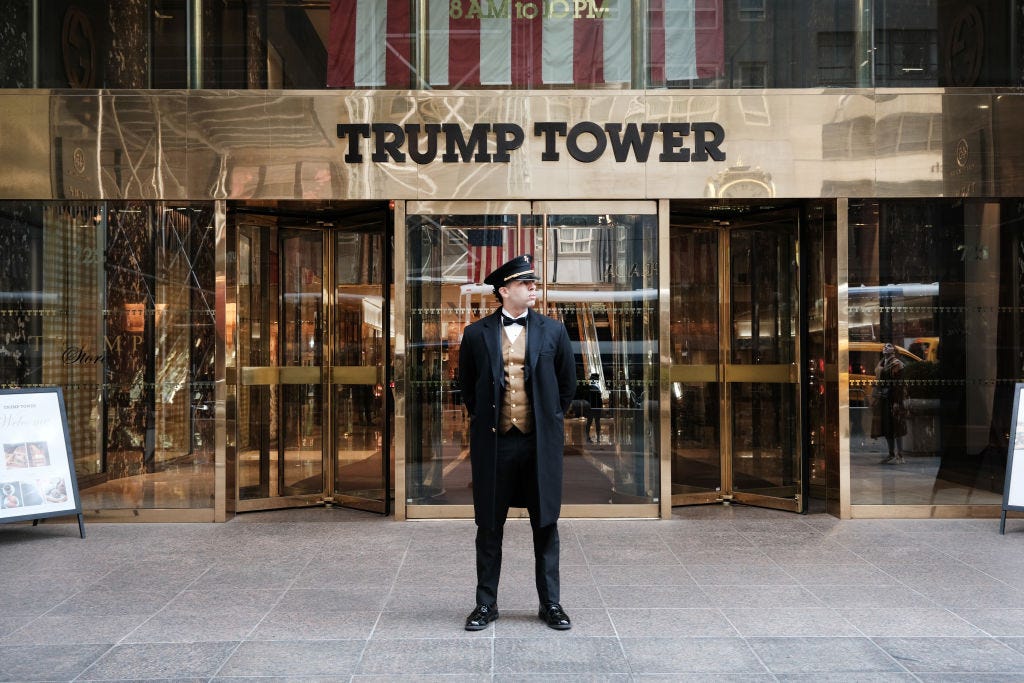TL(PM) DIGEST: Welcome Back, My Friends, to the Show That Never Ends
Plus, Biden's declining popularity, Europe's new approach to China, and Russian intelligence efforts in Ukraine
1. Former President Donald Trump indicted in New York City
What happened? Former President Donald Trump was indicted by a grand jury in Manhattan for actions related to an alleged 2016 illegal hush-money payment scheme to porn star, Stormy Daniels. The exact charges have not yet been revealed, but Trump likely faces more than 30 counts of business fraud. Trump’s lawyer says he will not take a plea deal and will instead prepare to go to trial.
Why does it matter? As a historical matter, Trump becomes the first U.S. president to be impeached twice and now the first ex-president to be charged with a crime. On a larger level, this indictment probably won’t matter much to normal Americans or to the fate of our country. (Anyone remember the impeachments?) Trump is responsible for his own actions and is accountable to the law just like anyone else. As a citizen—like the rest of us—he deserves his day in court and a fair chance to answer these charges, present his side, and clear his name. The burden of proof ultimately lies on the Manhattan District Attorney’s office to make this case, not on the accused.
In terms of politics, the rolling Trump circus and prospect of a trial in the middle of presidential primary elections will certainly play an outsized role in Republican politics. How exactly it will play out, no one knows.
TLP’s take: America is a strong and resilient nation based on the rule of law and will survive whatever chaotic final act Donald Trump has in store for everyone. There’s nothing more to say about the former president at this point. Every angle on Trump, good and bad, has been exhaustively covered. The New York judicial system, and perhaps those in other states, will determine his legal fate. Republican voters in the upcoming primaries, and potentially a wider pool of American voters in 2024 battleground states, will determine his political fate.
Rather than spend the next year and half waist-deep in the media muck of the Trials of Donald Trump—the ultimate reality show—TLP will treat him like just another presidential candidate, analyzing his strengths and weaknesses with voters and examining his policy ideas.
2. President Biden’s job approval declines—again
What happened? New polling from the Marquette Law School shows President Joe Biden’s job approval rating dropping to 39 percent—the second lowest mark of his presidency.
Why does it matter? It’s too far out to adequately measure the 2024 general election. But ahead of his expected re-election campaign announcement, President Biden still has a lot of work to do with voters to convince them that he deserves a second term.
TLP’s take: We should avoid making too many assumptions about the 2024 election. The exact contours of the race—and even the main candidates—are nowhere near determined and any number of potential events could unfold over the next few months. Notably, despite all the turmoil and angst among Republicans with Trump, the nation still remains essentially bifurcated in terms of a prospective 2024 presidential vote. Both Donald Trump and possible Republican candidate Ron DeSantis are basically even with Biden in head-to-head match-ups in the Marquette polling.
3. Europe’s new tack on China
What happened? Ahead of a trip to Beijing with French President Emmanuel Macron, European Commission President Ursula von der Leyen gave a major speech to a Brussels think tank calling for the European Union to “de-risk” its relations with China. Beijing, she noted, “is becoming more repressive at home and more assertive abroad,” intending to make the world dependent on China in pursuit of the clear goal of “systemic change of the international order with China at its centre.” “And we have seen the show of friendship in Moscow which says a thousand words about this new vision for an international order.”
Why does it matter? Von der Leyen called on the EU to “reassess” the Comprehensive Agreement on Investment it negotiated three years ago with Beijing “in light of our wider China strategy.” She also pledged greater “alignment with other partners” like the United States, Japan, Australia, India, and Latin America—bringing Brussels much closer to those countries like the United States that are “more advanced in their thinking on de-risking.” It’s also a strong challenge to voices in Europe who still hold out hope for conciliatory relationship with Beijing.
TLP’s take: Von der Leyen’s speech is a welcome articulation of a more assertive EU approach to China, one that can provide a solid foundation for greater trans-Atlantic cooperation moving forward and deals a serious blow to Beijing’s yearning to drive a strategic wedge between Europe and the United States. If it takes hold, it portends a significant shift in Europe’s foreign policy—and represents an opportunity the Biden administration can’t afford to waste.
4. A reliance on defeatism and pessimism failed the Kremlin early on in Ukraine
What happened? The Royal United Services Institute—an eminent British defense and security policy think tank—released a report this week detailing the central role of intelligence and influence operations in Russia’s war against Ukraine. It argues that the Kremlin’s initial February 2022 offensive failed mainly because it depended excessively on influence operations designed to undermine the support for the Ukrainian government both at home and abroad—not necessarily because of Russian military incompetence or ineptitude.
Why does it matter? Russia’s initial invasion depended on defeatism and pessimism to take hold among ordinary Ukrainian military and law enforcement units, the Zelenskyy government in Kyiv, and Ukraine’s international backers like the United States, effectively handing Ukraine over to the Kremlin on a silver platter and without much of an actual fight. Moreover, the report details Moscow’s plans for systematic, premeditated war crimes across a conquered Ukraine—including show trials, torture, and executions—plans that were put into grim practice in occupied regions and towns like Mariupol.
TLP’s take: Defeatism and pessimism remain critical strategic tools for the Kremlin, ones it uses to convince its adversaries and rivals to give up without putting up much of a fight against the might of Russia—and ones far too many American and European policy analysts and political leaders have chosen to echo for a variety of reasons. It’s important to keep these cynical strategies and tactics in mind when discussing diplomatic peace proposals and entertaining pleas for negotiation to end the bloodshed in Ukraine, to say nothing of the suffering inflicted on Ukrainians trapped in Russian-occupied territory.
Just one more thing…
Did T. rex have lips? Paleontologists now think so—yet another thing Jurassic Park probably got wrong thirty years ago.






